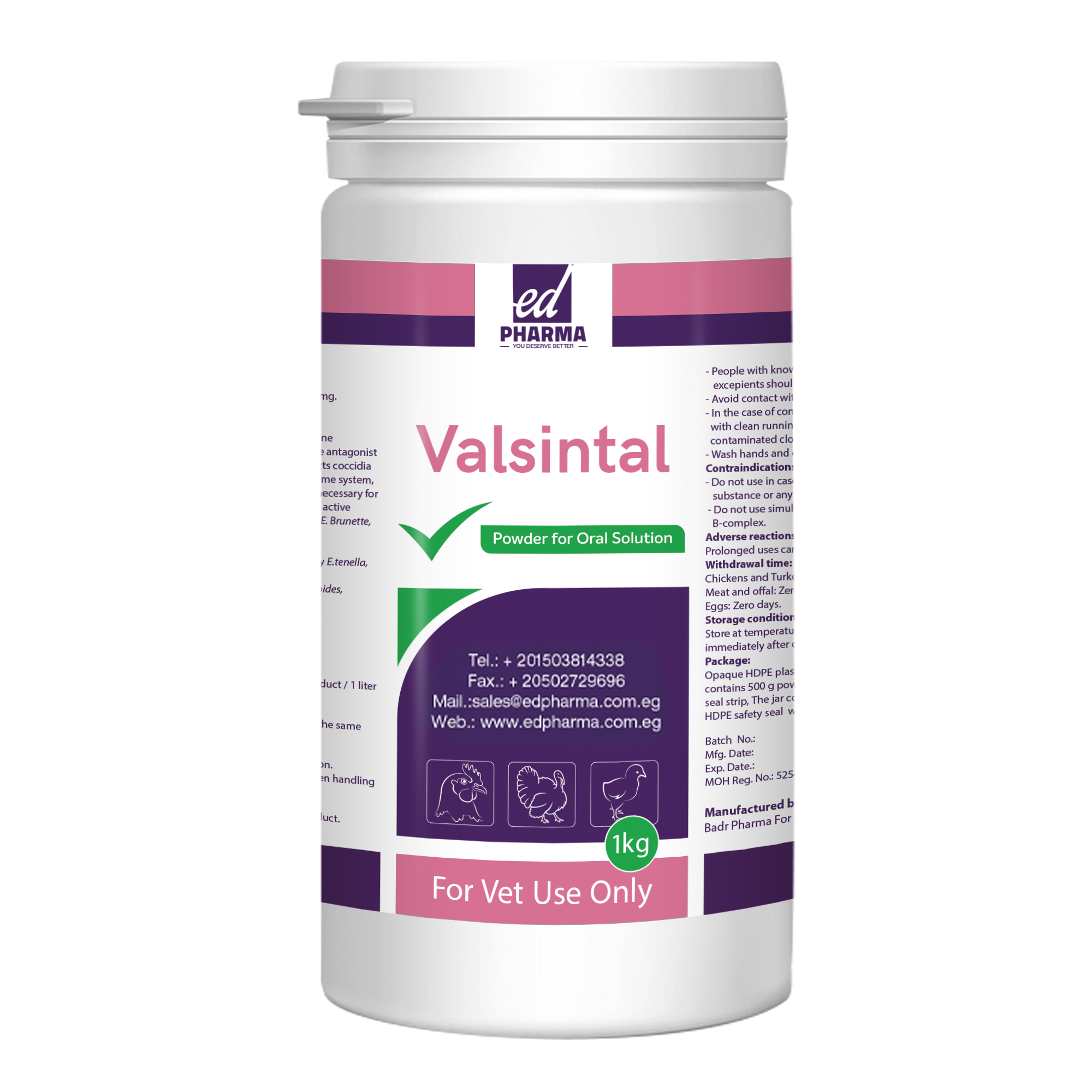VALSINTAL
VALSINTAL
VALSINTAL
(W.S.G)
(For vet. use only)
VALSINTAL
Each 1 gm contains:
Tylvalosin tartrate 714.95 mg (Eq. to Tylvalosin 625 mg)
Tylvalosin tartrate 714.95 mg (Eq. to Tylvalosin 625 mg)
Tylvalosin is a macrolide antibiotic. Macrolides are metabolites or derivatives of metabolites of soil organisms obtained by fermentation. They interfere with protein synthesis by reversibly binding to the 50S ribosome subunit. They are generally considered bacteriostatic. Tylvalosin has activity against pathogenic organisms isolated from a range of animal species-mainly Gram-positive organisms and mycoplasma but also some Gram-negative organisms. Macrolides (including tylvalosin) have been shown to have effects on the innate immune system, which may augment the direct effects of the antibiotic on the pathogen and aid the clinical situation.
Chickens: Tylvalosin has activity against the following mycoplasma species found in chickens: Mycoplasma gallisepticum. The minimal inhibitory concentration (MIC) of tylvalosin for M. gallisepticum ranges from 0.007 to 0.25 μg/ml.
Turkeys: Tylvalosin has activity against Ornithobacterium rhinotracheale, a Gram-negative organism found in turkeys and chickens. The MIC of tylvalosin for Ornithobacterium rhinotracheale ranges from 0.016 to 32 μg/ml.
Chickens: Tylvalosin has activity against the following mycoplasma species found in chickens: Mycoplasma gallisepticum. The minimal inhibitory concentration (MIC) of tylvalosin for M. gallisepticum ranges from 0.007 to 0.25 μg/ml.
Turkeys: Tylvalosin has activity against Ornithobacterium rhinotracheale, a Gram-negative organism found in turkeys and chickens. The MIC of tylvalosin for Ornithobacterium rhinotracheale ranges from 0.016 to 32 μg/ml.
Broiler Chickens:
Treatment of Chronic respiratory disease, Infectious sinusitis cause by Mycoplasma gallisepticum.
Turkeys: Treatment of respiratory disease cause by Ornithobacterium rhinotracheale.
Turkeys: Treatment of respiratory disease cause by Ornithobacterium rhinotracheale.
Broiler Chickens and turkeys.
Route: Orally via drinking water.
Broiler Chickens: 400 mg per liter of drinking water per day for 3 consecutive days.
Turkeys: 400 mg per liter of drinking water per day for 5 consecutive days.
Broiler Chickens: 400 mg per liter of drinking water per day for 3 consecutive days.
Turkeys: 400 mg per liter of drinking water per day for 5 consecutive days.
Medicated drinking water should be replaced every 24 hours. The product should be added to a volume of water that the broiler chickens will consume in one.
No other source of drinking water should be available during the medication period. Opened sachets should not be stored, use immediately. Contra - Indications: Not authorized for use in birds producing eggs for human consumption.
Do not use after the expiry date stated on the label.
None known.
Meat and offal: 2 days.
Store at temperature not exceeding 30ºC, in dry place, used immediately after opening and used for 24 hours after reconstitution at temperature not exceeding 30ºC.
Transparent LDPE plastic bag containing 50 gm water soluble powder in (HDPE) plastic container with (HDPE) plastic cap with an outer label and insert.
